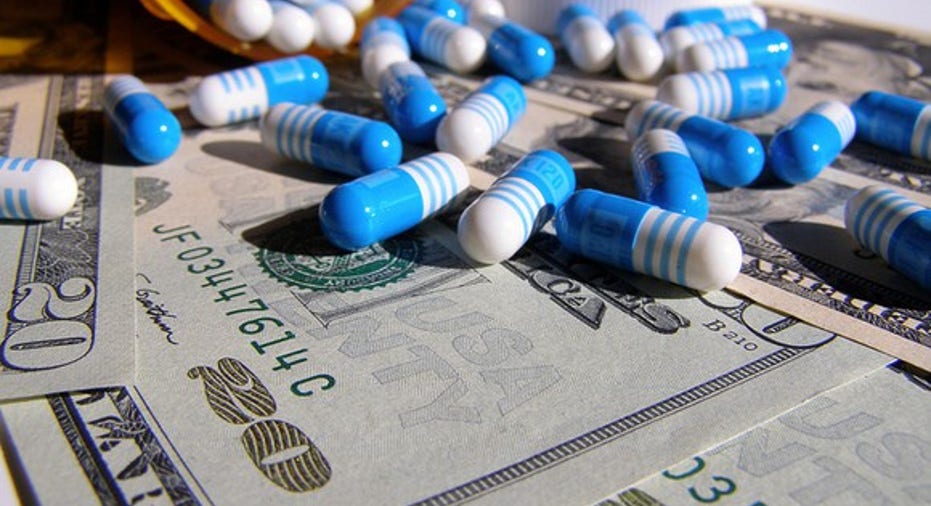Medicare Negotiating of Drug Prices May Not Be the Cure to High Costs

Image source: Stockmonkeys.com via Flickr.
Presidential candidates Donald Trump and Hillary Clinton have said that giving Medicare the ability to negotiate prices directly with drugmakers could yield important savings that firm up Medicare's financial future. However, industry experts are increasingly questioning that thinking. Can Medicare's negotiating might rein in high drug costs, or are there better options?
Medicare's role
Medicare provides a healthcare safety net to American seniors, but the payment of medicine used to treat Medicare patients falls on private insurers, not government.
That's because Medicare relies on part D to provide drug coverage, and Part D plans are private plans offered by insurers, including UnitedHealth Group (NYSE: UNH), the nation's largest health insurer. UnitedHealth Group's part D plans insure 4.9 million Americans, and overall, UnitedHealth's various individual, employer, Medicare, and Medicaid plans cover 50 million Americans.
UnitedHealth Group negotiates prices directly with drugmakers through its wholly owned pharmacy benefit manager. Payers commonly use PBMs to manage their drug costs by negotiating pricing, boosting adherence, and driving conversion to from brand drugs to lower-cost generics.
UnitedHealth Group's PBM combines the buying power of UnitedHealth's various member plans with the buying power of individual companies that self-insure, such as General Electric. By combining together, they're already able to negotiate significant price cuts with drug developers.
Similar use of PBMs occurs throughout the industry.Express Scripts (NASDAQ: ESRX)and CVS Health (NYSE: CVS), for example, compete against UnitedHealth's PBM, and each of them manages drug programs for tens of millions of patients.
Since PBMs are for-profit companies that make their money by squeezing every last dime they can out of drugmakers, it's hard to believe that Medicare can do better on its own. That line of thinking has researchers at the Leonard D. Schaeffer Center for Health Policy and Economicsthinking that other cost-cutting efforts could offer a bigger payoff.The researchers suggest that Medicare do the following:
- Encourage the use of pay-for-performance deals.
- License curative medicines for a one-time premium.
- Ramp up review times for biosimilars, or alternatives to costly biologic drugs.
- Require drugmakers justify price increases on long-standing drugs that have few competitors.
Pay-for-performance relationships are already being tested and succeeding in various markets. Italy has been using pay-for-performance for cancer drugs since 2010, and in those arrangements, Italy's healthcare system gets a discount on drugs failing to deliver on outcomes. Pay-for-performance doesn't have to be limited to cancer drugs, either.Italy and GlaxoSmithKline recently negotiated a pay-for-performance arrangement for a $665,000 one-time therapy for a rare genetic disease. When the therapy doesn't work, Italy gets reimbursed fully for that patient.
Licensing curative drugs that reduce long-term healthcare expensescould allow Medicare to reap the benefit of those lifelong savings more quickly.
Biosimilars could deliver even greater savings. Biosimilar research is one of the hottest areas in R&D, and while biologics are created in living organisms and they can't be duplicated exactly, researchers are showing that similarly developed drugs are as effective as the brand version. That's important, because biologics are the planet's most expensive drugs, and biologics with billions of dollars in annual sales are losing patent protection over the next few years.
It also appears to make a lot of sense to force drugmakers of long-standing medications to justify price increases. A company shouldn't be able to jack up the price significantly on a drug that's been available for decades just because it can.
Looking ahead
Medicare reform is important because Medicare spending already represents 15% of the federal budget, and spending is set to multiply as more baby boomers retire. Protecting Medicare in the decades to come is critical to supporting our seniors, and therefore it's vital that we consider various cost-savingapproaches, without limiting efforts to innovate.
The $15,834 Social Security bonus most retirees completely overlook If you're like most Americans, you're a few years (or more) behind on your retirement savings. But a handful of little-known "Social Security secrets" could help ensure a boost in your retirement income. For example: one easy trick could pay you as much as $15,834 more... each year! Once you learn how to maximize your Social Security benefits, we think you could retire confidently with the peace of mind we're all after.Simply click here to discover how to learn more about these strategies.
Todd Campbellhas no position in any stocks mentioned.Todd owns E.B. Capital Markets, LLC. E.B. Capital's clients may have positions in the companies mentioned.Like this article? Follow him onTwitter where he goes by the handle@ebcapitalto see more articles like this.The Motley Fool owns shares of and recommends Express Scripts. The Motley Fool owns shares of General Electric. The Motley Fool recommends CVS Health and UnitedHealth Group. Try any of our Foolish newsletter services free for 30 days. We Fools may not all hold the same opinions, but we all believe that considering a diverse range of insights makes us better investors. The Motley Fool has a disclosure policy.



















